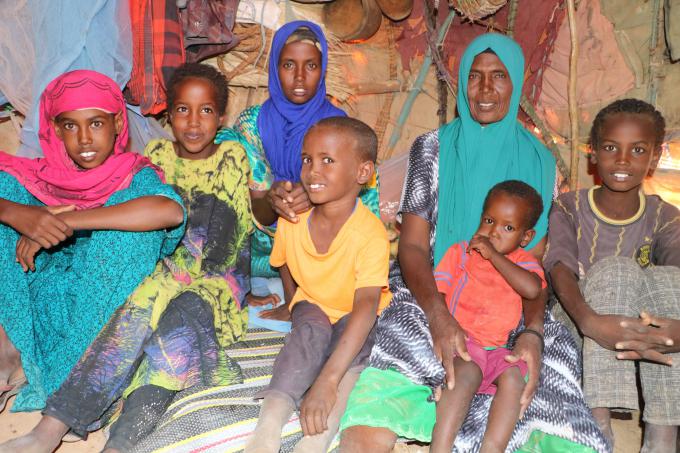We Cannot Complain about Water: Zeineb’s Story
In 2016, Zeineb Kayre Hussein, 40, was a pastoralist who always worked hard with her husband to sustain their decent livelihood from rearing their 200 shoats, 50 camels and 20 heads of cattle. One year on, here she is with her husband and their ten children in the Boholhagare temporary settlement for drought displaced people, losing all the livestock to the seemingly unending drought in Ethiopia’s Somali region.
Zeineb and her family walked some 25 kilometers from their village to the settlement for internally displaced persons (IDPs) seven months ago. Except for the make-shift house they carried on a donkey cart, they brought nothing to this site and entirely depend on sporadic host community and some NGO support. All this trying times, her family obtained 40 kilograms of sorghum from WFP just once and supplementary nutrition for her children with cases of moderate acute malnutrition (MAM) thrice.
Save the Children has been providing water, sanitation and hygiene (WASH) support for the 900 households including Zeineb and her family who are temporarily settling in Boholhagare IDP site in Somali’s Adadle Woreda. Zeineb said she regularly receives water purifying chemicals from Save the Children, and the organization provided her with a water bucket and Jerry can with which she fetches water. She said the people in the camp have improved on their cleanliness because of the eight latrines put in place in the camp by Save the Children.
Zeineb said the easier access to water from Save the Children installed water tanks in the camp, coupled with hygiene promotion activities by community volunteers like her, who were trained by the organization, has helped the IDPs to pursue better sanitation and hygienic practices. “Save the Children trained me and other volunteers to teach the people in the camp on how they should adopt proper hygienic and sanitary practices. There is already a great improvement and many in the community have stopped open defecation. They use the latrines built for us by Save the Children which we always keep clean,” Zeineb said. Because of Save the Children’s support, Zeineb said “We cannot complain about water, but food is very scarce.”
Save the Children implemented European Commission Horn of Africa - Emergency Response Mechanism (ECHO-ERM) project has reached around 33,887 people in Kelafo and Adadle Woredas of Somali’s Shebelle zone through its emergency WASH response to improve access to clean and safe water for IDPs and host communities. Funded by ECHO through IRC, the project has been providing water trucking services. It has also provided WASH kits to its targets in these Woredas. As a result, IDPs and host communities have been able to use clean and safe water as per the standard required during emergencies and they have improved their hygiene and sanitation practices.
 Ethiopia
Ethiopia 